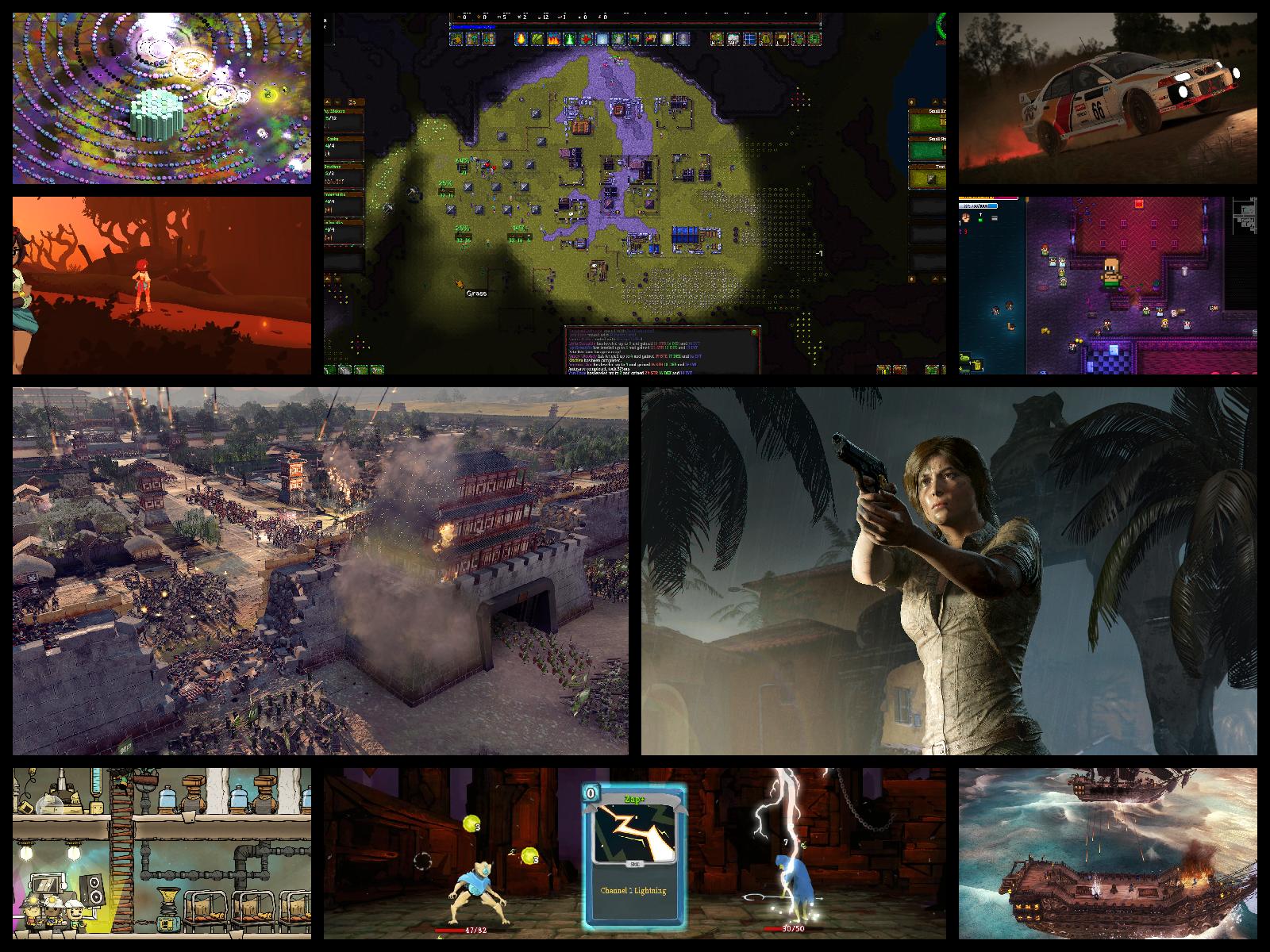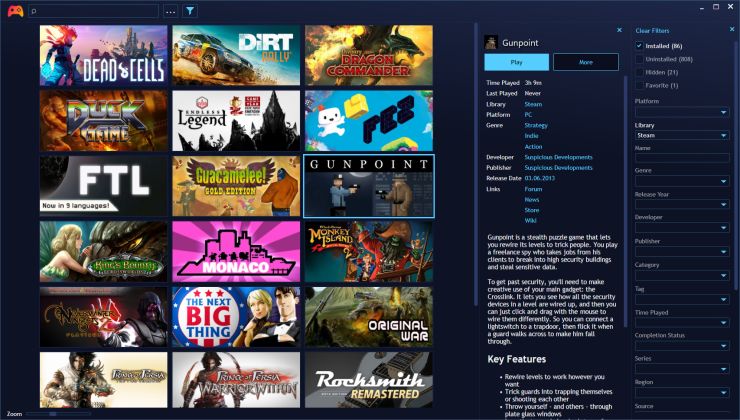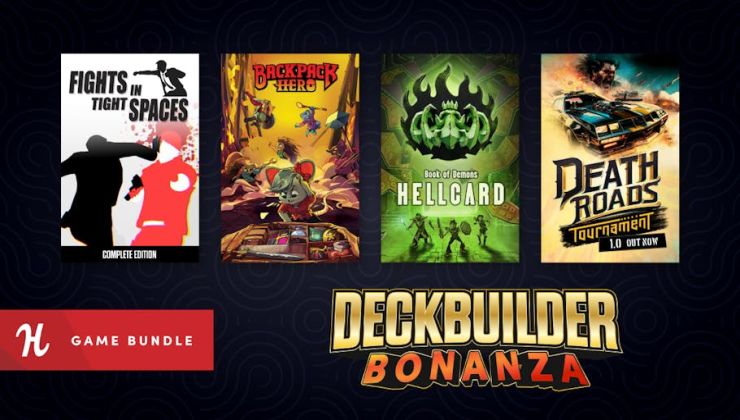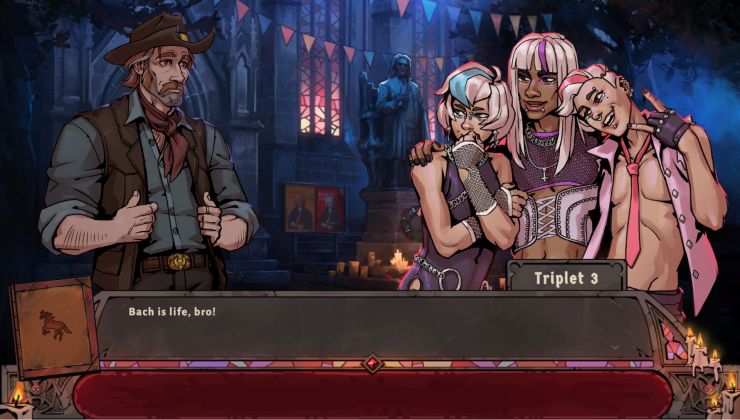2019 is coming to a close, it's been a pretty wild year for Linux gaming that's for sure! Here's some thoughts on the year and what to expect for 2020.
Firstly, let's look over all the games that came to Linux in 2019. As usual, very little AAA support but that doesn't mean we don't get awesome experiences. We've had a huge amount of quality games, which is the important thing. Not including those currently in Early Access, here's a few random picks we've had released this year for Linux: Abandon Ship, AI War 2, Shadow of the Tomb Raider Definitive Edition, DiRT 4, Total War: THREE KINGDOMS, Sky Racket, Rise to Ruins, Indivisible, Stygian: Reign of the Old Ones, Jenny LeClue - Detectivu, Police Stories, Overland, Devader, Dicey Dungeons, Oxygen Not Included, Streets of Rogue, Mosaic, The Eternal Castle: Remastered, Mindustry, Slay the Spire and so on.
Listing "good" games released across a year is always highly subjective of course, your list will be vastly different to my own and there's plenty I will have completely forgotten about. Tons that arrived in Early Access too throughout 2019 that are worthy of mentioning like Jupiter Hell, Monster Sanctuary, Wildermyth and Volcanoids.
Watching how stores evolved over this year has been interesting. Epic Games have been throwing out free games constantly, pulling in plenty of exclusives but they still have no plans to support Linux. Epic did throw us a little bone by giving Lutris some funding, that was great for them, but a drop in the ocean for Epic overall.
The other side is Valve with Steam, still continuing to put resources into making Linux gaming better. Not just with Steam Play Proton, but the recent Steam Runtime Container system which should eventually help reduce QA time/cost for developers who do want to support Linux. The ACO shader compiler (original announcement) for AMD GPUs is another big Valve project to make gaming on Linux smoother again.
The elephant in the room is of course the Linux gaming market share, at least when looking at the available percentages that Steam offers in their monthly hardware survey. We're still small, we are a niche market and we're going to remain that way likely for some time. Silver lining there though, somewhat, is that the Linux market share is mostly stable. How can we push it further? Marketing. We need more marketing and better marketing. That, plus Linux being available on more machines at top vendors. Those two things really are needed to help push it.
Sadly, this year we saw a few games drop Linux support entirely with Rust, Natural Selection 2, Forager and Throne of Lies. Not many, but even one dropping support is not good.
However, don't get too down about the above point. There's a huge amount of moving pieces, certainly when it comes to the future of Linux gaming. Right now, if you truly don't care about any details and just want to play games on Linux—you've never had it better. We have Steam Play, enabling Proton (and other tools like Boxtron) to run games through Steam not designed for Linux like Halo: The Master Chief Collection, No Man's Sky, Elite Dangerous, Deep Rock Galactic and plenty more. Wine also came along tremendously and when paired with DXVK/D9VK, even more games can be played easily on Linux like Overwatch.
I don't personally think Steam Play Proton/Wine should ever replace proper support, to make that clear. The last thing we need is more lock-in because developers end up seeing less of a point in using cross-platform tech and open APIs. For now though, while we're a niche, Steam Play Proton and Wine fill a big gap and they're definitely important for that. The most important part of Steam Play Proton, is people not losing access to their older Windows-only library when moving to Linux. Eventually when more people try out Linux and enjoy the experience and the market share rises as a result, then we can look to get proper support from more developers. Until then, be sure you keep supporting those who do put out Linux versions of their games.
We also have the rise of streaming platforms like Google Stadia further taking away barriers to playing bigger titles on Linux. There's also whatever Steam Cloud Gaming turns out to be, that's going to be very exciting to find out more on. Hopefully Valve won't keep us waiting too long on it. Streaming platforms still have a long way to go though, and they have their own barriers of entry (especially internet speeds and bandwidth).
Various other fun things were released this year too! Shadow of Mordor got a Vulkan Beta from Feral Interactive which gives some fantastic performance on Linux. A ton of great open source software came along nicely this year too like Lutris for managing games, vkBasalt for some fun extra post-processing, Godot Engine for game development, OBS Studio for recording and livestreaming, pyLinuxWheel and Oversteer for managing Logitech Wheels and so many more awesome projects had tons of improvements this year.
It's going to continue to be exciting to watch things grow and change over 2020. Thanks to many indie developers supporting Linux, the Unity Editor at some point will properly support Linux and when Unity has IL2CPP support on Linux with Unity 2019.3 it will be easier for developers again, Steam Play Proton and Wine will continue to mature, distributions and desktops will keep getting better and so on. There's always something improving somewhere.
We will be here to follow it all! What are your wishes for 2020? Do let us know in the comments.
This was also the busiest year on record for traffic and content here on GamingOnLinux!
2018 was already a big jump over 2017 but in 2019 we pushed things even further to bring you even more news! We're closing in on 2,300 articles posted this year. See some other stats on this page.
If you wish to support what we do, you can find out the various ways to do so on this dedicated page any time like Patreon, Paypal, Liberapay, Flattr, Twitch, Brave BAT, and Ko-fi. We also have partnerships with GOG and Humble Store/Bundles, if you use our affiliate links when you buy games we earn some pennies.
This year, we're having a little holiday livestream on December 24th so be sure to come join in if you're stuck, alone or you just want to have some Linux fun with us: Twitch Channel.
A super-massive thank you for all the support this year, here's to an awesome 2020!
Personal note: I will be completely away on December 24th, December 25th and again on December 31st/January 1st for some rest and relaxation to prepare for another year.
Ion Fury
The Bard's Tale IV
From the failures:
We Happy Few
Another very negative trend is M$ swallowing good Linux supportive studios like inXile and Obsidian. I think it's safe to assume they are lost to Linux gaming now.
Wishes for 2020:
More developers who release for Stadia, to start releasing for desktop Linux proper. I'd like to see these released for desktop Linux users:
* [Cyberpunk 2077](https://www.gog.com/wishlist/games/cyberpunk_2077_on_linux) (CD Projekt Red)
* [Bloodlines 2](https://forum.paradoxplaza.com/forum/index.php?threads/bloodlines-2-for-linux.1162040/) (Hardsuit Labs / Paradox)
* [Baldur's Gate 3](http://forums.larian.com/ubbthreads.php?ubb=showflat&Number=652719) (Larian)
Last edited by Shmerl on 15 Dec 2019 at 6:23 pm UTC
We're still small, we are a niche market and we're going to remain that way likely for some time.
What, if anything, do you think will move the needle in this regard?
I can see SteamPlay 2.0 causing an increase in our marketshare on Steam's hardware survey, but only if the number of AAA "Whitelist" games is increased dramatically, updated regularly, and marketed widely. It seems like so many PC gamers are completely unaware of how easy it is to have a near-complete experience on Linux these days. So far it doesn't look like Valve is ready to do those things, and is content to work in the background to improve the underlying technology, so I think we'll stay where we are for the near future.
Thanks for another good year of content Liam, and best wishes to all for the festive season.
Last edited by bradgy on 15 Dec 2019 at 6:26 pm UTC
Marketing and more vendors having Linux installed on their systems. Currently, the Linux desktop has very little good marketing.We're still small, we are a niche market and we're going to remain that way likely for some time.
What, if anything, do you think will move the needle in this regard?
What, if anything, do you think will move the needle in this regard?There is only one thing that would matter, and it's the same now as it was 10 years ago.
End Microsoft Windows dominance as the default operating system for new computers.
This would probably require legislation. Microsoft will never give up their stranglehold on the market. NEVER.
Maybe also prohibit companies from subsidizing their own OS so Microsoft couldn't give the big OEM computer manufacturers 'free Windows copies', so to speak.
If retailers were mandated by law to give consumers a choice of pre-installed OS, with costs clearly defined and choosing Windows would mean choosing to pay market price for it... I speculate that a good number of people would save that 100€ or whatever a reasonable market price would be for the current Windows version.
Sadly the Linux distro aspect in this scenario isn't even relevant right now since it's pretty much a pipe dream.
Honestly, if the thousands of games we got was not able to give us a push, I am not sure what could.
The good news of 2019 is that Proton largely made the problem irrelevant, because nobody really needs to actively support us anymore for us to be able to play their games. Which is the and the only reason why 2019 might have been the best year for Linux gaming yet. For the first time ever, we're able to play a healthy portion of all AAA games on Linux.
Yes, I know some people would disagree with me. But my opinion is that I don't care what makes a game run on Linux as long as it runs.
The worrisome bit is that our market-share is still exactly the same 1% it has been before Steam for Linux was launched (which was arguably the birthday of Linux as a viable gaming platform). I clearly thought that the only thing Linux needed to take off as platform was games. We got games. But still no growth. And that's -despite- Microsoft decided to do us a favor by replacing the well-liked Windows 7 with that buggy mess of spyware that is Windows 10.As I mentioned in my other comment: Marketing. What have we had? Basically nothing. There's plenty inside the Linux circles, not enough that's made and pushed out to the masses.
Honestly, if the thousands of games we got was not able to give us a push, I am not sure what could.
We can have as many games as Windows, it would still hardly budge us until some marketing starts to sink in and Linux is available at top tier vendors and advertising as being available on their machines. That is still our single biggest hurdle and will be for a long time. Dell are slowly expanding their Linux machines though and System76 continue doing great work too but we need a lot more.
In contrast, today Google is pouring a lot of resources into Stadia marketing.
Last edited by Shmerl on 15 Dec 2019 at 7:55 pm UTC
Marketing and more vendors having Linux installed on their systems. Currently, the Linux desktop has very little good marketing.
Being largely non-commercial, Linux desktop will unlikely ever have that kind of marketing. And I do not see that as a bad thing. The nature of it enforces a soft requirement that users have the wherewithal to be able to install and maintain their own systems. It keeps the Linux space filled with a healthy proportion of above-average-computer-literacy individuals.
I would love to see PC gamers adopt free operating systems as the "default" platform as much as anybody else here, but only if that does not mean doing so at the expense of quality of it's users.
Simply put, the traditional Linux desktop is not amenable to mass consumer facing business models and cracking that nut is going a bit of a white whale for us.
I suspect that one of the only ways we can begin to tackle this would be by ending "educational partnerships" in which schools teach dependency on proprietary software as a natural way to use computers.
In the sense of not pushing/convincing AAA developers and
publishers to release native Linux builds BUT there is a
need to keep the Linux client alive.
People have bought games for the Linux platform.
So the client is here to stay for some time.
Valve cannot simply say good bye to it, can they?
So while Proton and all the other (great) stuff from Valve looks
like commitment to the Linux platform it could be just life support.
When has been the last time you heard some enthusiastic plans
about Linux from Valve?
Heck, they even managed to announce a Half-Life title with just Windows support. :/
I really hope to be proven wrong to the fullest.
Thank you Liam, for the great work you do.
Enjoy your days off. Well deserved.
I'm a bit afraid that Proton IS Valve's exit strategy from Linux.
In the sense of not pushing/convincing AAA developers and
publishers to release native Linux builds BUT there is a
need to keep the Linux client alive.
People have bought games for the Linux platform.
So the client is here to stay for some time.
Valve cannot simply say good bye to it, can they?
So while Proton and all the other (great) stuff from Valve looks
like commitment to the Linux platform it could be just life support.
When has been the last time you heard some enthusiastic plans
about Linux from Valve?
Heck, they even managed to announce a Half-Life title with just Windows support. :/
I really hope to be proven wrong to the fullest.
Thank you Liam, for the great work you do.
Enjoy your days off. Well deserved.
The team working on Linux at valve has never been huge, ten people at most. Other devs don't really care about Linux.
The worrisome bit is that our market-share is still exactly the same 1% it has been before Steam for Linux was launched (which was arguably the birthday of Linux as a viable gaming platform).But we have grown! :) Given how fast Steam as a whole is growing, the number of Linux users must have increased proportionally with all those new Windows and Mac users to keep that 1% steady. If we hadn't grown, that'd be more like 0.0001% now. :)
I absolutely agree that it'd be wonderful to see that 1% starting ticking upwards, but in absolute terms, there are more people gaming on Linux now than ever before.
----------------------------
Another perspective on Proton, is that it's less about playing new games (which we can hope to have native versions in the future) and more useful as a way to play older games which will never get a Linux port (due to developer shutting down, rights issues, lost source code, or whatever). For instance just yesterday I discovered that Star Wars: Episode I: Racer was on Steam, got it working, and have been reliving my childhood. :D
I only started using Steam in 2011, and switched to Linux 2014, and had been consciously buying only games with Linux versions for a year or so before that, so I didn't have to give up too many games to make the switch; but for plenty of people, before Proton came out, switching would've meant giving up potentially a pretty large part of their library. I still think Proton is possibly a double-edged sword, with the potential to cause companies not to produce a Linux native version because "it can run on Proton", but I think the utility it offers in allowing hundreds (thousands at this point?) of older games to be run shouldn't be underestimated.
When has been the last time you heard some enthusiastic plans
about Linux from Valve?
fsync and ACO are quite big efforts.
Exactly. ACO affects AMD GPUs in a big way across basically all Linux games.When has been the last time you heard some enthusiastic plans
about Linux from Valve?
fsync and ACO are quite big efforts.
Exactly. ACO affects AMD GPUs in a big way across basically all Linux games.
Also, not sure how much they are invested, but they seem to be quite busy with VR, and were working on the Linux side of things. VR is a niche technology now, due to high costs of the headsets, but still.
Last edited by Shmerl on 15 Dec 2019 at 11:48 pm UTC
Keep up the great work Valve, Code Weavers, and everybody else contributing to Proton, DXVK, D9VK, wine, wine-staging, etc. Y'all are doing yeoman's work.












 How to set, change and reset your SteamOS / Steam Deck desktop sudo password
How to set, change and reset your SteamOS / Steam Deck desktop sudo password How to set up Decky Loader on Steam Deck / SteamOS for easy plugins
How to set up Decky Loader on Steam Deck / SteamOS for easy plugins
See more from me